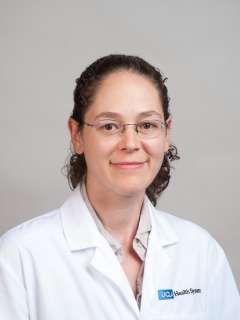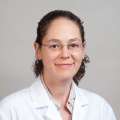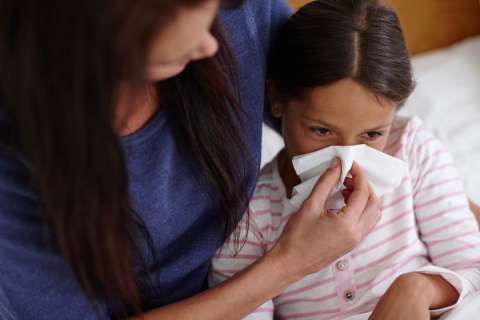Rebecca Dudovitz, MD, describes herself as “a Los Angeles lifer. A proud product of public education all the way through.”
Now the general pediatric division chief at UCLA’s Mattel Children’s Hospital and director of pediatric health services research at the David Geffen School of Medicine, Dr. Dudovitz is committed to delivering the most extensive and inclusive services to young patients from the division’s staff of 18 clinicians and researchers, a PhD-prepared researcher and a global health pediatrician based in Mozambique.
A UCLA medical school graduate, Dr. Dudovitz completed pediatrics residency training and served an additional year as chief resident at UCLA, followed by a fellowship in the Robert Wood Johnson Foundation Clinical Scholars Program (now the National Clinician Scholars Program), earning a master’s degree in health services.
She joined the faculty at UCLA and has been an integral part of the division for just over a decade. Under her leadership, Dr. Dudovitz plans to grow established multidisciplinary pediatric programs.
Three expansion targets
“We have a top specialty program for children with complex medical diagnoses,” she explains. “These children may have undergone organ transplantation or were born with a congenital syndrome requiring multiple surgeries. They may have different organ systems involved and may need to see multiple subspecialists — a cardiologist, kidney doctor, ophthalmologist, member of our craniofacial team, geneticist, etc.”
A care team, including a nurse practitioner and care coordinators, helps families coordinate medical visits, testing, and medications, as well as home health and various therapies their children need.

Next up for expansion is a multidisciplinary obesity program. “New obesity guidelines recommend children have access to a program like the one we’ve built here, but currently, we can’t serve all the kids who could benefit. There’s a huge need,” says Dr. Dudovitz, noting childhood obesity grew during the COVID-19 pandemic as children lost access to sports and nutritious meal programs.
“Bodies come in all shapes and sizes; we’re not so much focused on children’s weight as we are on how healthy they are,” she clarifies. “Our concern is about things that come from obesity, like fatty liver disease, diabetes and high blood pressure. We see early signs of these problems in our children.”
The division’s multidisciplinary craniofacial program serves children requiring a variety of specialists to meet unique needs and has the essential building blocks for growth, says Dr. Dudovitz.
“These young patients have common cranial facial problems, such as cleft lip or cleft palate, causing health challenges like difficulty feeding, speaking and swallowing, and increased risk for ear infections,” she explains.
“Another common problem is plagiocephaly, wherein the child’s head shape is not round, caused by a variety of things. Our team of pediatricians and surgeons can evaluate children with essentially any problem pertaining to their skull and head. Some cases, if left untreated, might affect brain development.”
Social innovation
Dr. Dudovitz says she is proud of the innovative work being done to integrate management of social needs and social complexity with youths’ medical needs. Most of the division’s patients come from low-income, publicly insured communities, she says.
“In addition to biomedical components of health, we also need to manage patients’ social needs. We’ve started to screen for adverse childhood experiences for all patients and have integrated a psychologist on site. We can immediately refer patients to mental health support right from our clinic. It meets a huge need amid a mental health crisis,” she says.
“There are so many sources of stress, depression, anxiety. I have treated a child with mental or behavioral health problems at virtually every single clinic session I have had over the last two years since COVID-19. Fortunately, things are improving now that we’re in that endemic phase and are putting support systems in place for kids.”
When not solving challenges for pediatric patients, the mother of two says her whole family enjoys playing brass instruments together, attending concerts at the Hollywood Bowl, and rooting for the UCLA Bruins and the LA Lakers. A lover of hiking and traveling, Dr. Dudovitz and her family hiked the Inca Trail, then visited a research center in the Peruvian Amazon last summer. “Our next goal is to see the Northern Lights,” she adds.
While she likes to travel far afield, Dr. Dudovitz has no plans of leaving her professional home at UCLA. “I love being part of a rich academic community and exchanging ideas with colleagues. I love being part of an environment where we’re all learning as individuals, constantly teaching and always striving to build on a well-functioning system.
“Part of the reward of a leadership role is being able to put structures in place that make for the healthiest, most vibrant academic and healthcare community, for ourselves, our learners and our patients.”




